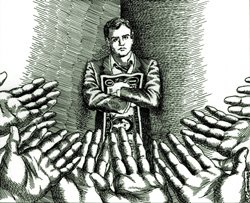
Doug Bandow
http://www.jewishworldreview.com -- THE TAX BURDEN is the highest since 1944, at the height of World War II, but Americans don't seem to care. They might care, however, if Congress allows the Clinton administration to hire hundreds more Internal Revenue Service auditors.
The federal government is awash in cash. Uncle Sam is taking about one-fifth of the nation's GDP, and the Democratic president and Republican Congress are busy concocting new ways to spend the burgeoning surplus.
Treasury Secretary Lawrence Summers argues that the income-tax burden is falling for many families. But people, not companies, pay taxes. And people pay more than just income taxes. If you count Social Security levies, the corporate income tax, excises on products such as cigarettes and services such as telephones, and other taxes, Americans are paying more than ever before in peacetime and only a little less than during the worst war in U.S. history. So much for Bill Clinton's concern for the middle class.
Nor is Washington ever satisfied. The Clinton administration believes the IRS is too gentle. With more staffers and more money, the agency could squeeze additional cash out of Americans.
Treasury officials whine that companies - shock! - structure transactions to avoid or reduce taxes.
"Corporate tax shelters are our No. 1 problem," complains Summers. And "not just because they cost money but because they breed disrespect for the tax system."
The real problem, however, is a perversely intricate tax code combined with high tax rates. In response to administration proposals to browbeat accounting firms and impose an excise tax on tax-shelter promoters and buyers, House Majority Leader Richard Armey observed: "The fact of the matter is that we write the Tax Code, and any corporation ought to do what they can to minimize that cost on behalf of their shareholders."
Even more curious is the complaint of Christopher Bergin, editor of the publication Tax Notes, that tax shelters "cross the line and are pure and simple theft."
Attempting to save one's money while meeting the letter of the law is not theft. Politicians taking people's earnings to hand out to favored interest groups, in contrast, is theft.
The administration is also upset that the IRS is auditing fewer returns than in the past. The president wants to increase the IRS budget by 9 percent and hire 633 new auditors. Even some GOP congressmen, who posture as friends of the taxpayers, support the idea.
IRS officials cite an increase in overdue taxes and worry about unreported income:
Collections may be up, but they should be up even more. Fail to improve enforcement, warns IRS Commissioner Charles Rossotti, and "the risk to the tax system will become very high and the effects very difficult and extraordinarily expensive to reverse."
Yet, the problem with the tax system is not that it is insufficiently intrusive. The IRS currently employs some 12,000 auditors and remains the most feared agency in Washington.
Instead of trying to increase tax terror, Congress should address the reasons why people cheat: rates are high, regulations are confusing, and deductions are unfair. People know that most of the 1,200 tax changes made by Congress over the past five years benefited influential
 |
Indeed, some of the people enforcing and making the tax law don't bother paying. Early during the Clinton presidency, a Democratic National Committee staffer and White House lawyer were discovered to be welching on their taxes; the former didn't even file.
Last year, reports the IRS, more than 13 percent of White House staffers were behind in their tax payments. "Only" 7 percent are now delinquent, with some $652,210 in back taxes owed.
Bill and Hillary Clinton filed, but Money magazine figured that they owed more than $100,000 in taxes and interest based on their returns from 1977 through 1992. There were inflated charitable contributions, nondeductible campaign outlays disguised as unreimbursed business expenses and improper deductions on the Whitewater investment. When caught, the Clintons denied any wrongdoing, but they wrote Uncle Sam a check.
The Republican Congress isn't much better. Amazingly, 8.4 percent of House and 7.6 percent of Senate members and staffers are behind in their taxes. The total owed runs $10.5 million. If administration and congressional officials are worried about uncollected taxes, maybe administration and congressional officials should pay up.
America's tax system is a mess. The fault doesn't lie with the IRS, whose employees face the impossible task of enforcing the law fairly. It lies with Congress, which writes the law.
Instead of hiring more auditors, legislators should pass real tax reform. Lower rates,
simplify regulations, and make the system fairer. Most important, reduce the burden on the
American
JWR contributor Doug Bandow is a senior fellow at the Cato Institute.
Comment by clicking here.

